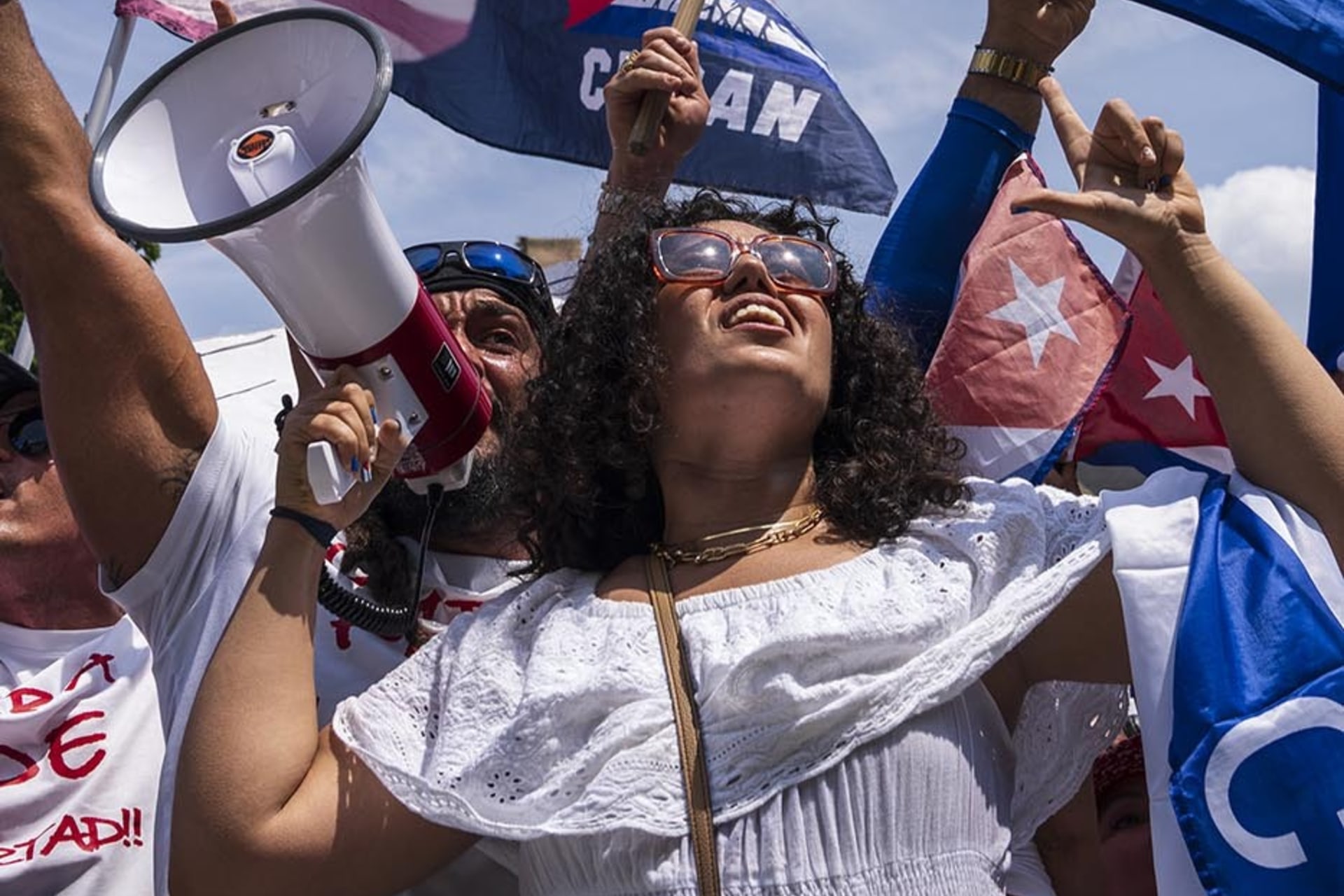Taiwan Raises Its Voice Again
Published
Taiwanese President Chen Shui-bian is continuing to take steps toward Taiwan independence that are seen as provocative and unwelcome by Beijing and Washington. But experts say his actions are driven by domestic political concerns and have little chance of altering the cross-Strait relationship.
What are backgrounders?
Authoritative, accessible, and regularly updated Backgrounders on hundreds of foreign policy topics.
Who Makes them?
The entire CFR editorial team, with regular reviews by fellows and subject matter experts.
This publication is now archived.
How serious are the recent tensions between China and Taiwan?
China and Taiwan have both escalated their rhetoric lately, as Taiwanese President Chen Shui-bian continues to challenge China’s claim to Taiwan. China’s official “one China” policy says Taiwan is a part of China that will one day be reunited with the mainland. Chen, a proponent of Taiwanese independence, has repeatedly called Taiwan an “independent, sovereign country” that should reject the one-China claim. Chen’s position has invited serious rebukes from Beijing and Washington, neither of which wants to change the deliberately ambiguous status quo relationship between Taiwan and China.
But there is a political context, too. Chen may see domestic political gain in pressing the independence issue now. “The situation may not be as tense as it appears,” says Jing Huang, senior fellow in foreign policy studies at the Brookings Institution. Other experts agree that impending crisis is unlikely. “I tend to see this as part of a larger pattern: China refuses to talk with Chen Shui-bian, and Chen uses the lack of dialogue to press ahead with his own domestic agenda,” says Elizabeth Economy, senior fellow and director of Asia Studies at the Council on Foreign Relations.
What was the National Unification Council?
A mostly symbolic body set up in 1990 by the government of the former ruling party, the Kuomintang (KMT), as a conciliatory gesture to China and pro-unification hardliners in Taiwan. The NUC was tasked with crafting guidelines for eventual reunification. The guidelines, issued in 1991, said reunification would be gradual and would only come about with a free, democratic, and equitably prosperous China.
How significant was Chen’s decision to abolish it?
On February 27, Chen announced the NUC had “ceased to function.” The council had not met in six years, but abolishing the council and the reunification guidelines brought stern reactions against Chen from both Beijing and Washington. Chinese officials warned Chen’s move “could bring disaster,” and Senator John Warner (R-VA), chairman of the Senate Armed Forces Committee, warned Taiwan that the United States would not necessarily defend it if it provoked a war with China through “inappropriate and wrongful politics generated by the Taiwanese elected officials.”
How much support does Chen have for his policies in Taiwan?
Chen won the presidency in 2000 with only 39 percent of the vote after his two opponents split the rest of the vote. In 2004, he won re-election with a razor-thin margin of only 30,000 votes out of more than 13 million cast. A series of irregular events occurred around the elections: Chen and his vice presidential candidate were shot and slightly wounded a few days before the vote, a subsequent state of emergency mobilized 200,000 soldiers and policemen and prevented them from voting, and Taiwan’s Central Election Commission declared more than 330,000 votes invalid after concerns over polling irregularities. Opponents said all three of these events prejudiced the vote, and challenged the results. Taiwan’s High Court eventually decided against the challengers, but the experience only exacerbated the country’s political fissures.
“Very few places have such divided politics,” Huang says. The country is nearly evenly split between Pan-Blues—those who favor the status quo with China, eventual reunification, and the Kuomintang (KMT) Party or People First Party (PFP)—and the Pan-Greens—pro-independence voters, many native Taiwanese, who support Chen’s Democratic Progressive Party (DPP). While Chen has a stronghold among the DPP party faithful, his national approval ratings have hovered between 10 percent and 20 percent. But, Economy says, there is “still a significant part of Taiwan’s population [that] supports what he’s doing.” And the more Beijing tries to marginalize him, the more that support increases in his core constituency, she says.
What are Chen’s domestic political considerations?
In December 2005 the DPP suffered a tremendous loss in local elections, winning only six of twenty-three local constituencies while the KMT-led coalition took the rest. The results were seen as a midterm rebuke to Chen, whose party is also suffering from a series of corruption scandals and lack of progress on domestic issues. “Ever since the December elections, Chen has felt marginalized and is trying to regain center stage politically,” Huang says. Many analysts said the election results also showed it may be hard for DPP to hold onto the presidency in upcoming elections in 2008. “There’s a lame-duck aspect to Chen Shui-bian, and he’s trying to address that,” Economy says. “In the long run, Chen is constrained,” agrees David Kang, visiting professor and East Asia expert at Stanford University. “He’ll have a difficult time pulling some stunt.” Chen—who cannot run again in 2008—is instead trying to position his party to hold onto power, experts say.
What has Chen been doing in Taiwan?
In his New Year’s Day address January 1, Chen said he would focus on strengthening Taiwan’s “separate identity” and reforming Taiwan’s constitution, both seen as provocative by Beijing. The constitutional changes, critics fear, could ask Taiwanese citizens to vote on the issue of sovereignty. At the end of January, Chen reshuffled his cabinet and placed hard-line DPP partisans in power. The new appointees, including James Huang as foreign minister and Su Tseng-cheng as prime minister, are seen as very committed to Chen’s pro-independence agenda. Experts say Chen is focusing on Taiwan independence in part because he has not been a particularly effective president. The legislature—controlled by an opposition KMT/PFP coalition—has managed to block or change most of his initiatives in the last few years, leading to political gridlock. “With the legislative-executive split in government, political stalemate and infighting has continued to characterize Taiwan’s political scene,” says a recent Congressional Research Service (CRS) report on Taiwan (PDF).
What has China done?
Beijing is trying to isolate Chen while reaching out to Taiwanese opposition leaders and trying to gain U.S. support. In March 2005, China passed the Anti-Secession Law, which made it illegal for Taiwan to declare independence and authorized the use of “non-peaceful means” to reunify Taiwan with China. Then China’s leaders invited the heads of Taiwan’s main opposition parties to meet with Chinese President Hu Jintao. In April and May 2005, Lien Chan, head of the KMT, and James Soong of the People First Party (PFP) both visited the mainland and were welcomed with great ceremony. While some saw the visits as improving Sino-Taiwanese relations, critics called them a deliberate insult to Chen. “Beijing’s strategy is to keep Taiwan politics as divided as possible,” Huang says.
China is also trying to win over the “hearts and minds” of Taiwanese by allowing more contact between the island and the mainland. Exchanges and economic contacts are growing more frequent: Over 13 million Taiwanese have visited the mainland in recent years, and over 250,000 mainland Chinese academics and experts have traveled to Taiwan. And as part of their charm offensive, experts say, China’s leaders have learned to be more measured in their reactions to provocative moves. “They’ve learned from past mistakes not to play into Chen Shui-bian’s hands,” Huang says. After Chen abolished the NUC, experts say, Beijing waited for the United States to weigh in and put pressure on Chen, which it did. “Both China and the United States have a pretty clear understanding that they don’t want to go to war over Taiwan,” Kang says.
What is the role of cross-Strait trade?
In 1989, the first year business contact was officially allowed, trade between China and Taiwan—mostly routed through Hong Kong—was estimated at $3.9 billion. In 2004, it had grown to $62 billion, an average annual growth rate of 25 percent. The figures for 2005 are expected to top $70 billion. Cross-Strait trade is very good for Taiwan: in 2004, Taiwan’s trade surplus with China was nearly $30 billion. Taiwanese foreign direct investment in China is estimated at between $42 billion (the official figure) and $120 billion dollars (including investment routed through other countries or offshore corporations).
But the economic activity is viewed differently by the opposite sides of the independence debate. China sees growing economic interdependence as a precursor to unification, while pro-independence Taiwanese leaders see it as a burden to their hopes for autonomy. The Taiwanese business community, which tends to be pro-status quo and KMT-leaning, has been quiet about Chen’s recent pro-independence moves. They fear official reprisals from the Taiwanese government and don’t want to risk jeopardizing their positions, writes journalist Craig Meer in the Asia Times.
What role does the United States play in the China-Taiwan relationship?
Soon after George Bush took office in 2001, he made strong statements in favor of defending Taiwan that many observers saw as moving the United States away from its traditional policy of “strategic ambiguity” toward a stronger emphasis on Taiwan’s interests. However, in the years since, experts say the United States is shifting away from its pro-Taiwan stance as China becomes more important to Washington both economically and politically. Huang says that especially after the Iraq war—which cost the United States a good deal of European support for its foreign policy initiatives—China became an even more critical ally. “We [now] have to make more compromises with China in order to win their cooperation because we don’t have Europe with us anymore,” he says.
The U.S. shift toward a more neutral position on the Taiwan issue was helped by Chinese President Hu. When he came to power in 2003, experts say he made a subtle shift in Chinese policy from “unification first” to “stability first.” While previous Chinese leaders had emphasized bringing Taiwan back under the mainland’s control, Hu seemed to focus on accepting a status quo relationship: preventing Taiwanese independence while making unification a long-term goal. Now, experts say, Chinese leaders are looking to “co-manage” the Taiwan issue with Washington. “U.S. officials could face increasing pressure to abandon the traditional ’noninvolvement’ U.S. approach and instead adopt a mediating role in the cross-Strait relationship,” the CRS report states.
As Hu prepares to visit the United States in April, both China and Taiwan are competing for U.S. favor. But Chen’s recent actions haven’t helped his relations with either Beijing or Washington. “The kind of statements Chen’s made have negative impacts on both cross-Strait relations and relations with the United States,” Economy says. And other experts say the United States has so many important issues to discuss with China—including currency valuation, military spending, and trade deals—that it doesn’t want to get bogged down in a conflict over Taiwan. In the end, Huang says, the Taiwanese people understand they can’t alienate their most important ally. “The Taiwanese understand that they need the United States to be with them in the face of an ever-stronger China,” Huang says. t
Colophon
Staff Writers
- Esther Pan





